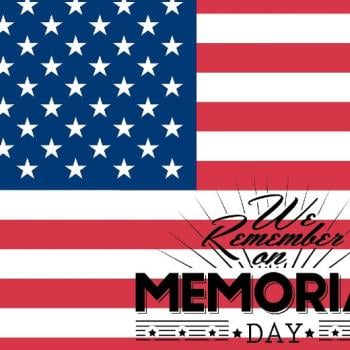By Rabbi Yonassan Gershom - May 24, 2009
The Vulcan "live long and prosper" salute is based upon a blessing gesture used by the Jewish priests (kohanim) during the worship service, and was created by Leonard Nimoy (Spock), who drew on his on childhood synagogue experiences for the inspiration.
 The most famous Jewish influence on Vulcan culture in Star Trek is the "live long and prosper" hand gesture. This "Vulcan salute," as it has come to be called, was invented on the set by Leonard Nimoy during the filming of the second-season opener, "Amok Time." In this episode, Spock goes into something like a male estrus cycle, called pon farr in the Vulcan language. Comparing himself to a salmon swimming upstream to spawn, Spock tells Kirk that he must return to Vulcan to mate with his betrothed bride, T'Pring, or die trying. The wedding ceremony would be the first glimpse of Spock's home world in the series.
The most famous Jewish influence on Vulcan culture in Star Trek is the "live long and prosper" hand gesture. This "Vulcan salute," as it has come to be called, was invented on the set by Leonard Nimoy during the filming of the second-season opener, "Amok Time." In this episode, Spock goes into something like a male estrus cycle, called pon farr in the Vulcan language. Comparing himself to a salmon swimming upstream to spawn, Spock tells Kirk that he must return to Vulcan to mate with his betrothed bride, T'Pring, or die trying. The wedding ceremony would be the first glimpse of Spock's home world in the series.
Nimoy felt that there should be some kind of distinctive greeting among Vulcans, analogous to a handshake or a bow. Alan Dean Foster's novelization, based on an early script, has Spock kneeling before the Vulcan matriarch, T'Pau, who places her hands on his shoulders, like royalty dubbing a knight. But Nimoy didn't care for this. Previous episodes had already established that Vulcans are touch telepaths. Therefore, a touch on the shoulders would be an invasion of privacy. Instead, Nimoy drew upon his own Jewish background to suggest the now-familiar salute. Back in the 1960s, hippies who watched "Amok Time" thought the salute was a variation of the two-fingered peace sign. But we Jews knew better. The Vulcan salute came not from protest marches, but from the pulpit of Nimoy's childhood synagogue.
The Vulcan greeting is based upon a blessing gesture used by the kohanim (koe-hah-NEEM) during the worship service. The kohanim are the genealogical descendants of the Jewish priests who served in the Jerusalem Temple. Modern Jews no longer have priests leading services as in ancient times, nor do we have animal sacrifices anymore. (Yes, people really do ask about that!) The sacrificial system ended with the destruction of the Temple by the Romans in the year 70 C.E. However, a remnant of the Temple service lives on in the "kohane blessing" ritual (duchenen in Yiddish) that is performed on certain holy days.
The actual blessing is done with both arms held horizontally in front, at shoulder level, with hands touching, to form the Hebrew letter "shin." This stands for the Hebrew word for "Shaddai," meaning "Almighty [God]." Nimoy modified this gesture into one hand held upright, making it more like a salute. So, technically, the Vulcan greeting is not the same thing as the ceremonial Jewish blessing. Still, the resemblance is close enough to evoke instant recognition among knowledgeable Jews.
During the synagogue service, the worshippers are not supposed to look at the kohanim while the blessing is being given. The reason for this is to focus our attention on the words of the prayer itself, rather than on the personalities of the kohanim. The kohanim are merely the channels, not the source, of the blessing, which comes from God. Unfortunately, all sorts of silly superstitions have arisen about this ritual, such as "Don't look at the kohanim, or you'll go blind!" and other nonsense. The real reason is simply to focus on receiving blessings directly from God, not from human beings.
Like most Jewish children, young Leonard Nimoy could not contain his curiosity about what the kohanim were really doing up there in front of the congregation. He writes:
"The special moment when the Kohanim blessed the assembly moved me deeply, for it possessed a great sense of magic and theatricality... I had heard that this indwelling Spirit of God was too powerful, too beautiful, too awesome for any mortal to look upon and survive, and so I obediently covered my face with my hands. But of course, I had to peek." (From his autobiography, I Am Spock.)
Nimoy survived his peeking unscathed, and saw the kohanim extending their fingers in the mystical "shin" gesture. That magical moment remained with him for life, and was there to draw upon years later when he invented the Vulcan salute.
Did Gene Roddenberry know, at the time of filming, that the Vulcan salute was based on a Jewish ritual? That question remains unanswered. My sense is that he probably didn't or he would have objected to it on the grounds of its being too "Judeo-Christian." More likely, he thought it was a weird variation of the peace sign. Certainly, that's how gentile Trekkers saw it for many years. Only much later did Nimoy publicly explain the source of his inspiration.
We should also note that the prohibition against peeking only applies during the actual blessing ritual. The gesture itself is nothing secret. You can see it openly displayed in books and on amulets, jewelry, wall decorations, and gravestones. Contrary to urban legend, Nimoy was not violating any Jewish taboos by using this gesture on "Star Trek," especially since he modified it from the original version. I, for one, think it's absolutely wonderful that something so authentically Jewish has become universally recognized as a greeting of peace. More than anything else in Trekdom, the Vulcan salute says to me, "Here there be Jews." It also provides a diplomatic way for me to greet female Trekkers at conventions without shaking hands. (Orthodox Jews do not shake hands with the opposite sex. I suppose that would also hold true for intersexed alien species.)




